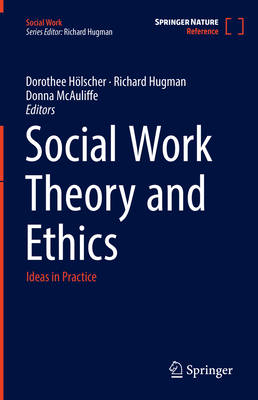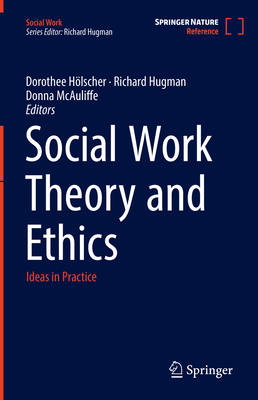
- Retrait gratuit dans votre magasin Club
- 7.000.000 titres dans notre catalogue
- Payer en toute sécurité
- Toujours un magasin près de chez vous
- Retrait gratuit dans votre magasin Club
- 7.000.0000 titres dans notre catalogue
- Payer en toute sécurité
- Toujours un magasin près de chez vous
412,95 €
+ 825 points
Description
This reference work addresses the ideas that shape social work. Much of the social work literature addresses questions of theory and ethics separately, so that the body of thought that is represented in social work scholarship and research creates a distinction between them. However, the differences between these categories of thought can be somewhat arbitrary. This volume goes beyond this simple separation of categories. Although it recognises that questions of theory and ethics may be addressed distinctly, the connections between them can be made evident and drawn out by analysing them alongside each other.
Social work's use and development of theory can be understood in two complementary ways. First, theory from the social sciences and other disciplines can be applied for social work; second, considered, systematic examinations of practice have enabled theory to be developed out of social work. These different approaches are usually referred to as 'theory for practice' and 'practice theory'. The advancement of social work theory occurs often through the interplay between these two dimensions, through research and scholarship in the field.
Similarly, social work ethics draw on principles and concepts that have their roots in philosophical inquiry and also involve applied analysis in the particular issues with which social workers engage and their practices in doing so. In this way social work contributes to wider debates through advancement of its own perspectives and knowledge gained through practice.
Social Work Theory and Ethics: Ideas in Practice offers a unique approach by bringing together the complementary dimensions of theory with each other and at the same time with ethical research and scholarship. It presents an analysis of the ideas of social work in a way that enables connections between them to be identified and explored. This reference is essential reading for social work practitioners, researchers, policy-makers, academics and students, as well as an invaluable resource for universities, research institutes, government ministries and departments, major non-governmental organisations, and professional associations of social work.
Social work's use and development of theory can be understood in two complementary ways. First, theory from the social sciences and other disciplines can be applied for social work; second, considered, systematic examinations of practice have enabled theory to be developed out of social work. These different approaches are usually referred to as 'theory for practice' and 'practice theory'. The advancement of social work theory occurs often through the interplay between these two dimensions, through research and scholarship in the field.
Similarly, social work ethics draw on principles and concepts that have their roots in philosophical inquiry and also involve applied analysis in the particular issues with which social workers engage and their practices in doing so. In this way social work contributes to wider debates through advancement of its own perspectives and knowledge gained through practice.
Social Work Theory and Ethics: Ideas in Practice offers a unique approach by bringing together the complementary dimensions of theory with each other and at the same time with ethical research and scholarship. It presents an analysis of the ideas of social work in a way that enables connections between them to be identified and explored. This reference is essential reading for social work practitioners, researchers, policy-makers, academics and students, as well as an invaluable resource for universities, research institutes, government ministries and departments, major non-governmental organisations, and professional associations of social work.
Spécifications
Parties prenantes
- Editeur:
Contenu
- Nombre de pages :
- 543
- Langue:
- Anglais
- Collection :
Caractéristiques
- EAN:
- 9789811910142
- Date de parution :
- 18-03-23
- Format:
- Livre relié
- Format numérique:
- Genaaid
- Dimensions :
- 158 mm x 236 mm
- Poids :
- 1111 g

Les avis
Nous publions uniquement les avis qui respectent les conditions requises. Consultez nos conditions pour les avis.





